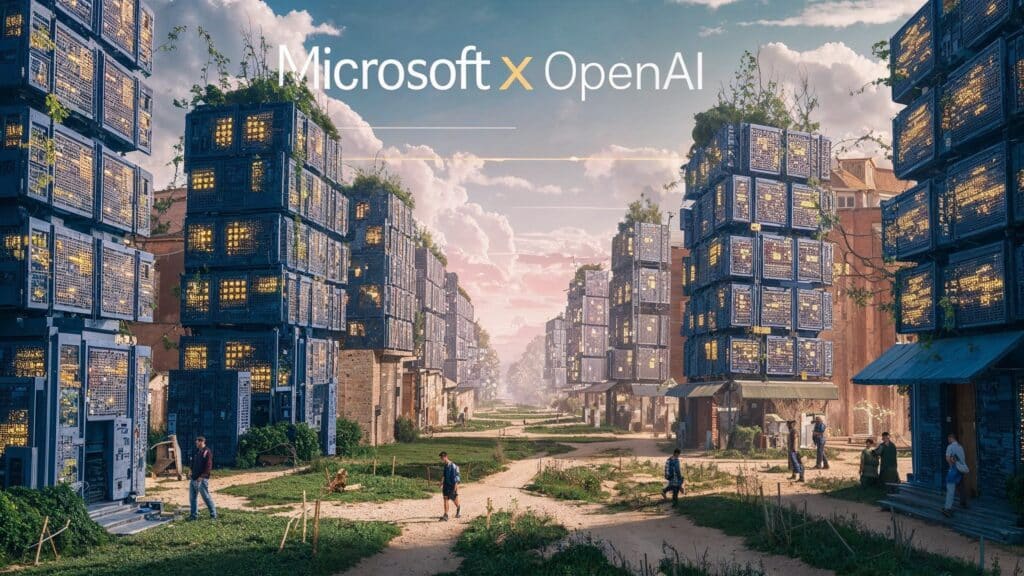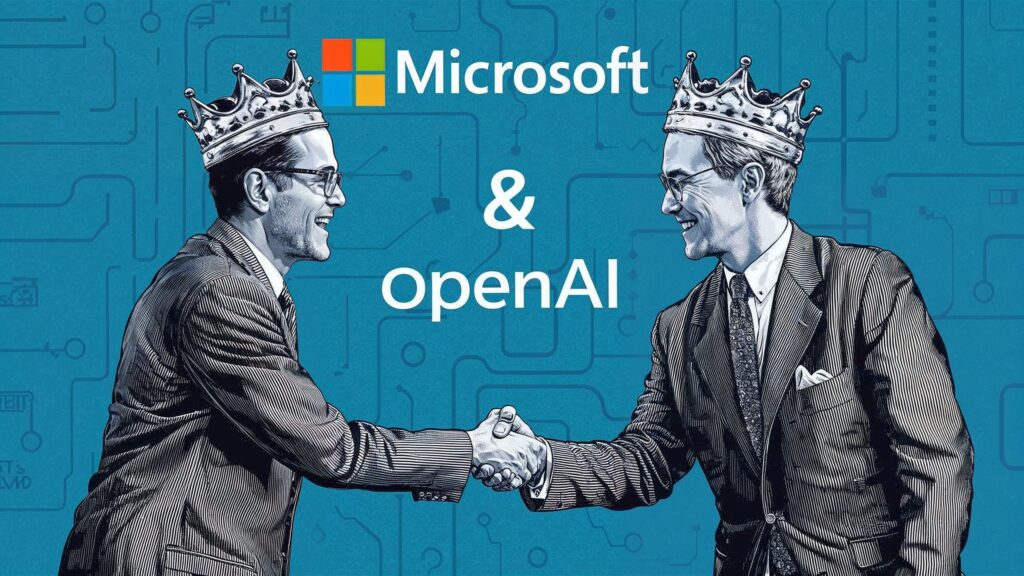In a world where artificial intelligence (AI) is becoming increasingly central, Microsoft and OpenAI have decided to push the boundaries of innovation with an ambitious project: Stargate. Scheduled for completion in 2026, this AI supercomputer represents a colossal investment of $100 billion. It aims to accelerate the development of AI through millions of AI gas pedals, while addressing important technological and environmental challenges. This strategic partnership could redefine the future of AI and its impact on our society.
Key points
- Microsoft and OpenAI join forces to create Stargate, an AI supercomputer with a budget of $100 billion.
- The project aims to integrate millions of AI gas pedals, underlining the scale of the investment in technological advancement.
- Stargate faces major challenges, including a projected energy consumption of 5 gigawatts and the need to find renewable energy solutions.
- This initiative marks a new phase in the collaboration between Microsoft and OpenAI, strengthening their position in the AI ecosystem.
- The economic, environmental and societal implications are considerable, raising questions about employment, environmental impact and technological sovereignty.
A disproportionate ambition for AI

This project marks a decisive step forward in the field of artificial intelligence. It aims not only to develop cutting-edge technologies, but also to address the security and ethical challenges posed by AI.
The main objectives of this collaboration include:
- The development of advanced AI technologies
- The answer to high-level AI attacks
- Exploring new AI applications in various sectors
What’s more, this partnership is also being closely scrutinized by regulators, not least because of its scale and potential impact on technological sovereignty and AI regulation on a global scale.
A colossal $100 billion budget
With a budget of $100 billion, the Stargate project is one of the most ambitious initiatives in the field of artificial intelligence. This astronomical sum underlines the unprecedented commitment of Microsoft and OpenAI to the research and development of advanced AI technologies.
The majority of this budget will be devoted to the acquisition of AI gas pedals, key components for increasing the supercomputer’s computing power.
Here is a simplified breakdown of planned expenditure:
- AI gas pedals: 70%.
- Infrastructure and development: 20%.
- Research and innovation: 10% of sales
Focus on environmental impact

Implementation of the Stargate project represents a colossal energy challenge, with an estimated power consumption of 5 gigawatts. This amount of energy is comparable to that produced by several nuclear power plants, underlining the scale of the project.
Stargate’s energy strategy must be based on renewable sources to minimize its environmental impact.
The search for renewable and low-carbon energy sources is therefore essential to meet Stargate’s needs while respecting the environment.
Microsoft and OpenAI promise innovative solutions :
- Search for renewable energy sources
- Optimizing the energy efficiency of data centers
- Reducing carbon footprint through advanced technologies
But with a launch scheduled for 2026, it’s doubtful that two years will be enough to find viable solutions to compensate for such high energy consumption!
The impact of artificial intelligence on the ecosystem

Microsoft and OpenAI strengthen collaboration
The strategic partnership between Microsoft and OpenAI intensifies as the Stargate project takes shape.
As a reminder, Microsoft and OpenAI have established a strategic and financial partnership that began in 2019 with an initial $1 billion investment by Microsoft in OpenAI. This partnership has been strengthened over time by additional investments and extended collaborations in the field of artificial intelligence.
In January 2023, Microsoft announced the third phase of its long-term partnership with OpenAI, involving a multi-year, multi-billion dollar investment, the exact amount of which has not been disclosed but is estimated by some sources at around $10 billion. This investment aims to accelerate breakthroughs in AI and ensure that the benefits of these advances are widely shared with the world.
In addition, Microsoft plans to deploy OpenAI models in its consumer and professional products, including Azure OpenAI Service, which enables developers to create advanced AI applications through direct access to OpenAI models supported by Azure’s AI-optimized infrastructure and tools.
As OpenAI’s exclusive cloud provider, Microsoft’s Azure will power all OpenAI workloads, covering research, products and API services. This means that all OpenAI developments will take place on Microsoft’s Azure cloud platform, reinforcing Microsoft’s position as a major player in the field of artificial intelligence.
It is also reported that, following a complex financial agreement, Microsoft could recover up to 49% of the capital of OpenAI’s commercial arm, while the non-profit parent company would retain just 2%. The remaining 49% would remain in the hands of the other shareholders.
However, this partnership has attracted the attention of antitrust regulators in Europe and the United States. The European Commission, the UK Competition and Markets Authority (CMA) and the US Federal Trade Commission (FTC) are examining the links between Microsoft and OpenAI to determine whether the agreements could amount to a disguised acquisition or whether Microsoft has control over OpenAI, which could have implications for competition in the AI sector.
Technological sovereignty
In the context of globalization and the race for innovation, technological sovereignty represents a major challenge for nations. The Stargate project, involving Microsoft and OpenAI, raises crucial questions about technological dependence and the ability of countries to maintain their autonomy in the field of artificial intelligence.
The mastery of advanced technologies such as AI is now inseparable from the economic and strategic power of states.
The collaboration between Microsoft and OpenAI could redefine the global balances in technology, highlighting the need for countries to develop their own AI capabilities. This implies not only massive investment in research and development, but also in training local talent.
New AI capabilities
The Stargate supercomputer aims to accelerate the development and performance of large language models (LLMs) and other AI tools. With millions of graphics processing units (GPUs) and unprecedented computing power, Stargate would enable OpenAI to train even more advanced AI models, such as an enhanced version of ChatGPT orother future projects like Sora, OpenAI’s video generator. This cutting-edge infrastructure could lead to the creation of AI models that better understand context, emotions and nuances, making interactions with AI more natural and effective.
Conclusion
Microsoft and OpenAI’s ambition to build an AI supercomputer under the Stargate project, with a budget of $100 billion, marks a significant milestone in the evolution of artificial intelligence. This pharaonic project, scheduled for 2026, raises both high expectations and considerable challenges, particularly in terms of energy consumption and environmental impact. However, if these challenges are met, Stargate could well revolutionize the field of AI, offering unrivalled computing capabilities and paving the way for major breakthroughs. This partnership between Microsoft and OpenAI perfectly illustrates the current obsessive exuberance around AI, while underlining the importance of collaboration and massive investment to achieve significant progress in this field.
Frequently asked questions
If you don't want to miss any AI opportunities
Subscribe to our newsletter!
